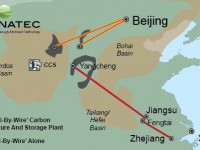Qi Ye, Professor, Tsinghua University
Jan 15, 2015
The ambitious U.S-China climate proposal created new emissions standards for U.S. domestic power plants, which will reshape the power sector on a state-by-state basis. The 30% CO2 reduction target is significant and won’t come without domestic political opposition, despite the EU’s even more ambitious targets.

Shen Dingli, Professor, Institute of International Studies, Fudan University
Dec 22, 2014
The commitments made at the Xi-Obama summit to reduce CO2 emissions are significant yet challenging for both nations to carry out over the next decade. The U.S. faces a more conservative Congress, and China faces the daunting task of creating to hydro and wind energy sources at a large enough scale. Both sides need to deliver, lest one side fault the other for not fulfilling their commitment.

Stewart Taggart, Founder & Principal, Grenatec
Dec 17, 2014
China’s decision to ban coal-fired power plants in Beijing by 2020 marks a big advance in battling climate change. Stewart Taggard argues that this is the first step in a long march toward wider application of ‘energy by wire.’
CNN,
Nov 18, 2014
The agreement between President Barack Obama and President Xi Jinping of China to reduce greenhouse gas emissions is the most important advance in the several d
Nov 18, 2014
President Obama over the weekend made a bizarre decision to attack and damage his closest ally in Asia, and one of the most committed supporters of U.S. foreign
Nov 17, 2014
Since the failure of the 2009 climate summit in Copenhagen, both the United States and China have largely retreated from big international agreements, each wait
Steven Hill, Senior Fellow, FairVote
Nov 17, 2014
Since China and the United States are the two biggest national emitters of carbon, the recently announced bilateral agreement is considered essential to concluding a new global accord, because unless Beijing and Washington can resolve their differences, few other countries will agree to mandatory cuts in emissions.
Kerry Brown, Professor of Chinese Studies, Lau China Institute at King's College, London
Nov 15, 2014
The consensus amongst the political elite in China since the 11th Five Year Programme issued in 2006 has been that climate change is a reality, and that its fiercest impact will fall on their country unless something is done.
Oct 28, 2014
Like the United States, India, and other nations, the guarantee and distribution of fresh water to meet the needs of population growth, industrial agriculture
Stewart Taggart, Founder & Principal, Grenatec
Oct 14, 2014
Can China provide intellectual leadership on climate change and green infrastructure? While Chinese President Xi Jinping may be missing this year’s UN Climate Summit, Stewart Taggart explores the policy mechanisms available to the nation as this year’s host of APEC.
Back to Top

- China-US Focus builds trust and understanding between the U.S. and China through open dialogue among thought leaders.
- Our Offerings
- Topics
- Videos
- Podcasts
- Columnists
- Research Reports
- Focus Digest
- Stay Connected
-
Thanks for signing up!
- Get the latest stories from China-US Focus weekly.